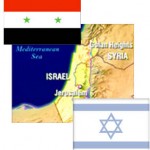Sunday
Mar072010
The Latest from Iran (7 March): The Elections Next Door
 Sunday, March 7, 2010 at 19:35
Sunday, March 7, 2010 at 19:35  2225 GMT: Petraeus Pronounces. On a slowish political evening, General David Petraeus dishes out some rhetoric on Iran's "thugocracy". We'll have an analysis tomorrow (hint: it's actually a signal that US is backing off any immediate military pressure), but for now, we've posted the video.
2225 GMT: Petraeus Pronounces. On a slowish political evening, General David Petraeus dishes out some rhetoric on Iran's "thugocracy". We'll have an analysis tomorrow (hint: it's actually a signal that US is backing off any immediate military pressure), but for now, we've posted the video.1945 GMT: Larijani Watch. Nice move by the head of Iran's judiciary, Mohammad Sadegh Larijani. He has announced the discovery of a large group inside the Government carrying out fraud and economic corruption: one case alone was embezzlement of 6 bilionl Toman more than $6 million).
NEW Iran: Senior Reformist Amani “We Have Not Decided to Remain Silent”
UPDATED Death, Confusion, and Clerics in Iran: The Case of Mohammad Amin Valian
NEW An Open Letter to the Editors of Iran’s “Principled” Newspapers
The Latest from Iran (7 March): The Elections Next Door
Thus, Larijani takes a swipe at Ahmadinejad and poses as a a defender of justice for the Iranian people.
1930 GMT: Bypassing Sanctions. All the way back to our first update (0730 GMT) on "Western" firms who trade with Tehran: Welt Online has a lengthy article on German companies who use Dubai as a "back door" to get into Iran.
1900 GMT: Political Prisoner Watch. Madhi Forouzandehpour, who was in charge of Mir Hossein Mousavi’s office, has been released after more than two months in detention.
1750 GMT: The Uranium Enrichment Deal. Don't say EA didn't tell you....
A couple of weeks after the visit by Speaker of Parliament Ali Larijani to Tokyo, this nugget from the Foreign Ministry:
Iran is ready to conduct its uranium exchange plan also with fresh countries, Foreign Ministry spokesman Ramin Mehmanparast said Sunday, according to the Fars News Agency.
"As we have reached no results yet with France, Russia and the United States over the uranium exchange plan, the International Atomic Energy Agency (IAEA) head has asked other countries to get involved," Mehmanparast said.
"We will wait and see whether other countries would be capable to provide us with the required fuel," the spokesman added in a meeting with students at the Shahid Beheshti university in Tehran.
Japan is reportedly one of the countries interested to get engaged in the deal.
1730 GMT: Political Prisoner/Mohareb Watch. Tehran Prosecutor General Abbas Jafari Doulatababi announced that 250 Ashura detainees have been indicted, but he said reports of a confirmed death sentence for Mohammad Amin Valian were false.
1710 GMT: Political Prisoner Watch. Leading student activist Abdollah Momeni has reportedly been released on $800,000 bail.
1645 GMT: Karroubi Takes on Mohareb. It looks like Mehdi Karroubi may have another front in his battle against the regime over its conception of "justice". He told an audience today,
I have previously pointed out [the need for] changing the definition of Mohareb [warring against God] in the current situation and have asked judiciary officials for its abolition....Some officials, unpremeditatedly or premeditatedly and even intentionally, called the streets protests and movements Moharebeh, and this is unfortunate.
Karroubi referred to the case of Mohammad Amin Valian, the Ashura protester condemned to death, as a “negative point” since Valian was only “taking part in street protests.” Karroubi claimed that Iranian officials "don’t know that Iran’s reputation in the international community is tarnished with such acts”.
1640 GMT: On the Women's Front. The Iranian Labor News Agency dares to proclaim, on the eve of International Women's Day, that "statistics and recent events in Iran indicate Iranian women did not experience an enjoyable year".
1630 GMT: That Cyber-War Thing. Following the declaration of Iranian officials that the Green Movement will be "crushed" in the battle of the Internet, an Islamic Revolution Guard Corps commander has said that 18,000 IRGC troops will be deployed in the "cyber-war".
1615 GMT: Political Prisoner Watch. Amirhossein Kazemi, weblog writer and member of the Freedom Movement of Iran, was arrested last night after being summoned to the Intelligence Ministry and taken to an unknown location. Emad Behavar, the head of the youth branch and member of the political bureau of the FMI, has been arrested for the third time in the post-election crisis.
Many of the FMI's leaders have been detained.
1200 GMT: We've posted an interview with a senior reformist, Shahrbanou Amani, considering the state of the Green Movement: "We Have Not Decided to Remain Silent".
1000 GMT: Posture of the Day. The Iranian Government, represented by Minister of Defense Ahmad Vahidi, is boasting of a new domestically-manufactured short-range cruise missile that can "eliminate targets of up to 300 tons".
0800 GMT: Butterfly on a Wheel. Golshifteh Farahani, the first Iranian actress since 1979 to appear in a major Hollywood film, has spoken of the oppression of Iran's artists by the current regime.
After her appearance in Body of Lies with Leonardo DiCaprio and Russell Crowe, Farahani was harassed by Iranian intelligence services for months before she went into exile in Paris.
Reacting to the arrest of award-winning director Jafar Panahi last week, Farahani said, "We are so angry. Jafar is one, maybe the only one… still in Iran who is talking. Most artists [in Iran] don't talk because they would rather work somehow. I appreciate that, but Jafar is the one who had the courage to talk, and he talked for everyone."
0755 GMT: A Government's Satanic Aims. Former President Mohammad Khatami has delcared in a speech:
It is a catastrophe that satanic aims and inhuman methods are imposed on the people in the name of God and holiness. Peace is the most beautiful word that exists, but unfortunately we see rare examples in the historical reality (today).
0750 GMT: Here's Some Culture for You. Former Minister of Culture and Islamic Guidance Mohammad-Hossein Saffar-Harandi has declared at a conference that Iran's "cyber-army" will reach "greater achievements", crushing the Green Movement.
0730 GMT: Nine months after Iran's Presidential election, media attention --- including that of Iranian outlets --- will be focused on a vote next door, as Iraqis go to the polls. We'll be starting our Iran morning in a reflective mood, with a senior reformist politician, Shahrbanou Amani, considering the state of the movement: "We have not decided to remain silent."
Anticipating US legislating punishing firms who trade both with the American Government and with Iran, The New York Times has published a list of 74 companies who could have been affected. Heading the list is Halliburton, the oil and gas drilling services firm connected with former Vice President Dick Cheney, at $27.1 billion. (Like a number of others on the list, Halliburton has now officially withdrawn from Iran.)
tagged  Abbas Jafari Doulatabadi,
Abbas Jafari Doulatabadi,  Abdollah Momeni,
Abdollah Momeni,  Ahmad Vahidi,
Ahmad Vahidi,  Amirhossein Kazemi,
Amirhossein Kazemi,  Ashura,
Ashura,  Cyber-War,
Cyber-War,  Emad Behavar,
Emad Behavar,  Freedom Movement of Iran,
Freedom Movement of Iran,  Golshifteh Farahani,
Golshifteh Farahani,  Halliburton,
Halliburton,  International Women's Day,
International Women's Day,  Iran,
Iran,  Iran Elections 2009,
Iran Elections 2009,  Iranian Labor News Agency,
Iranian Labor News Agency,  Islamic Revolution Guards Corps,
Islamic Revolution Guards Corps,  Jafar Panahi,
Jafar Panahi,  Leonardo DiCaprio,
Leonardo DiCaprio,  Madhi Forouzandehpour,
Madhi Forouzandehpour,  Mehdi Karroubi,
Mehdi Karroubi,  Mir Hossein Mousavi,
Mir Hossein Mousavi,  Mohammad Amin Valian,
Mohammad Amin Valian,  Mohammad Khatami,
Mohammad Khatami,  Mohammad Sadegh Larijani,
Mohammad Sadegh Larijani,  Mohammad-Hossein Saffar-Harandi,
Mohammad-Hossein Saffar-Harandi,  Mohareb,
Mohareb,  New York Times,
New York Times,  Russell Crowe,
Russell Crowe,  Shahrbanou Amani in
Shahrbanou Amani in  Middle East & Iran
Middle East & Iran
 Abbas Jafari Doulatabadi,
Abbas Jafari Doulatabadi,  Abdollah Momeni,
Abdollah Momeni,  Ahmad Vahidi,
Ahmad Vahidi,  Amirhossein Kazemi,
Amirhossein Kazemi,  Ashura,
Ashura,  Cyber-War,
Cyber-War,  Emad Behavar,
Emad Behavar,  Freedom Movement of Iran,
Freedom Movement of Iran,  Golshifteh Farahani,
Golshifteh Farahani,  Halliburton,
Halliburton,  International Women's Day,
International Women's Day,  Iran,
Iran,  Iran Elections 2009,
Iran Elections 2009,  Iranian Labor News Agency,
Iranian Labor News Agency,  Islamic Revolution Guards Corps,
Islamic Revolution Guards Corps,  Jafar Panahi,
Jafar Panahi,  Leonardo DiCaprio,
Leonardo DiCaprio,  Madhi Forouzandehpour,
Madhi Forouzandehpour,  Mehdi Karroubi,
Mehdi Karroubi,  Mir Hossein Mousavi,
Mir Hossein Mousavi,  Mohammad Amin Valian,
Mohammad Amin Valian,  Mohammad Khatami,
Mohammad Khatami,  Mohammad Sadegh Larijani,
Mohammad Sadegh Larijani,  Mohammad-Hossein Saffar-Harandi,
Mohammad-Hossein Saffar-Harandi,  Mohareb,
Mohareb,  New York Times,
New York Times,  Russell Crowe,
Russell Crowe,  Shahrbanou Amani in
Shahrbanou Amani in  Middle East & Iran
Middle East & Iran 



